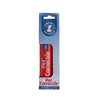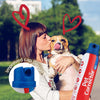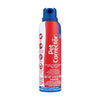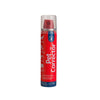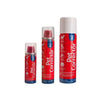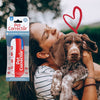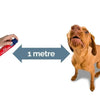The Pet Corrector emits a hiss of compressed gas (HFC 134a) which is completely safe for animals and produces a broad spectrum sound (white noise) varying from a low frequency rumble to a high frequency hiss to interrupt a dog’s unwanted behaviour.
The overall effect is to grab the attention of a dog. Dogs exhibit a wide range of reactions according to their hearing sensitivity and prior conditioning. Nevertheless, almost all dogs initially react to the Pet Corrector because the sound is genetically programmed to be associated with danger, such as from the hiss of a snake, an angry swan or the buzz of a dangerous insect.
The Pet Corrector interrupts many unwanted behaviours but is most often used for the following:
- Barking
- Jumping up
- Stealing food
- Chasing
- Place avoidance
An essential combination tool with reward-based training methods.
Other Uses
The Pet Corrector is not just for dogs. On Dr Mugford's farm, one young horse has a playful (and cruel) tendency to chase and bite sheep. Another, enjoyed chewing post and rail fences. Both 'misbehaviours' can be interrupted, even from a distance, by the Pet Corrector.
Cats can misbehave too! The Pet Corrector can be used effectively to interrupt their stalking and catching birds and to stop them using furniture as scratching posts.
Finally, always make sure that training is fun, keep training sessions short and always finish on a positive note.
Usage
There should be approximately 30 sound burst uses in the 30ml size canister, 50 in the 50ml and around 200 in the 200ml canister. These are approximate amounts and not guaranteed; number of uses will depend on usage.
These usage rates are based on a short, sharp bursts. In practice, users should not hold down the nozzle button for a full second or longer. If the nozzle is fully compressed for longer than a second, this will reduce the amount of uses available.
The nozzle should be compressed just long enough for the hissing sound to be emitted and for the dog’s attention to be gained. If you don't gain your animal's attention the first time round, repeat with a further short burst, rather than going for a longer one.
Do's and Dont's
DO
- Test your dog's sensitivity first: test at a distance greater than 1 metre, when your dog is displaying an unwanted behaviour.
- Hold the can at your side or slightly behind you, direct the can away from your dog.
- Only use the Pet Corrector™ to interrupt a serious misdemeanour, it is not a substitute for poor training!
- Understand that timing is crucial, it should only be used whilst the misbehaviour is occuring. Ensure that you reward immediately when the misbehaviour has ceased, ideally whilst he is performing a positive behaviour.
- Make the shortest possible sound burst of the PC because the canister will chill with prolonged use.
- Work on correcting one behaviour at a time; e.g. jumping up. Once this has been corrected, if required you can move on to the next behavioural problem.
- Dispose of the aerolsol responsibly when it is empty. Do not incinerate, burn or puncture the cannister.
DON'T
- Never use the PC without first reading the instructions first.
- Never let PC be used by children.
- Never point the PC can directly towards your face or towards your pet.
- Do not continue to use the PC if your dog has an excessively fearful reaction, he should recover from its use almost immediately. Similarly, it should not produce an aggressive response.
- Never use the PC on young puppies. Early positive training is the best way to resolve puppy training issues.
- Never use the PC on dogs who are anxious, have a scared disposition or who are senstive to noise.
- Never expose PC can to temperatures exceeding 50 degrees celcius or place in direct sunlight and ensure you always keep away from flames.
- Never place PC aerosol can in clothing pockets.
Videos



